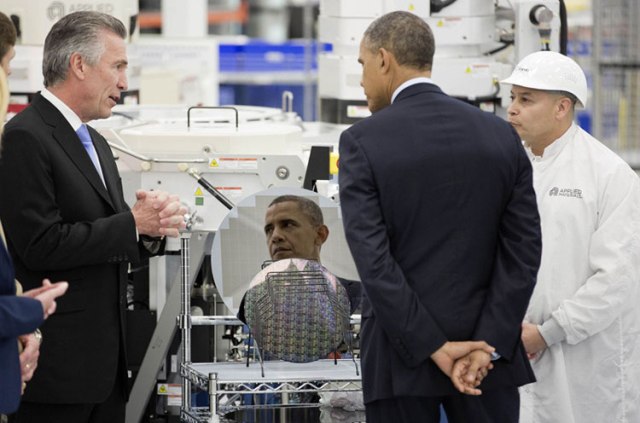Feb 18 2014
Molecular Imprints Inc., founded in 2001 by Cockrell School of Engineering professors S.V. Sreenivasan and Grant Willson, recently announced that Canon Inc. will purchase its semiconductor imprint lithography equipment business. Molecular Imprints’ innovative technology is the result of extensive research conducted at the Cockrell School and is a successful example of how UT Austin ingenuity is shaping the future of the nanomanufacturing industry.
 During a trip to Austin in May 2013, President Obama visited Applied Materials. Here, he stands in front of a 450-mm wafer designed by Molecular Imprints, a company founded by Cockrell School professors S.V. Sreenivasan and Grant Willson. (Photo courtesy Molecular Imprints.)
During a trip to Austin in May 2013, President Obama visited Applied Materials. Here, he stands in front of a 450-mm wafer designed by Molecular Imprints, a company founded by Cockrell School professors S.V. Sreenivasan and Grant Willson. (Photo courtesy Molecular Imprints.)
The technology that Willson, a chemical engineer and chemist, and Sreenivasan, a mechanical engineer, developed at UT Austin is a more cost-effective high-resolution printing technique used to make very high-resolution patterns used in the semiconductor and other industries.
The process helps manufacturers overcome some of the physical barriers involved in reducing the size of circuits in computer chips and other devices.
“The research conducted by professors Sreenivasan and Willson has led to significant innovations in the semiconductor industry and nanomanufacturing. Their success reinforces a culture of entrepreneurship and innovation among students and faculty in the Cockrell School,” said Cockrell School Interim Dean Sharon L. Wood.
As part of the purchase by Canon, the nanomanufacturing arm of Molecular Imprints will be spun out as a new company that will retain the name. Both companies will remain in Austin. The new Molecular Imprints will continue to work with the NASCENT center, a Cockrell School research unit at UT Austin’s J.J. Pickle Research Campus, of which Sreenivasan is co-director.
“We are very excited by this innovative semiconductor manufacturing opportunity and look forward to establishing an advanced technology development capability in Austin, Texas,” said Canon’s chief technology officer, Toshiaki Ikoma.